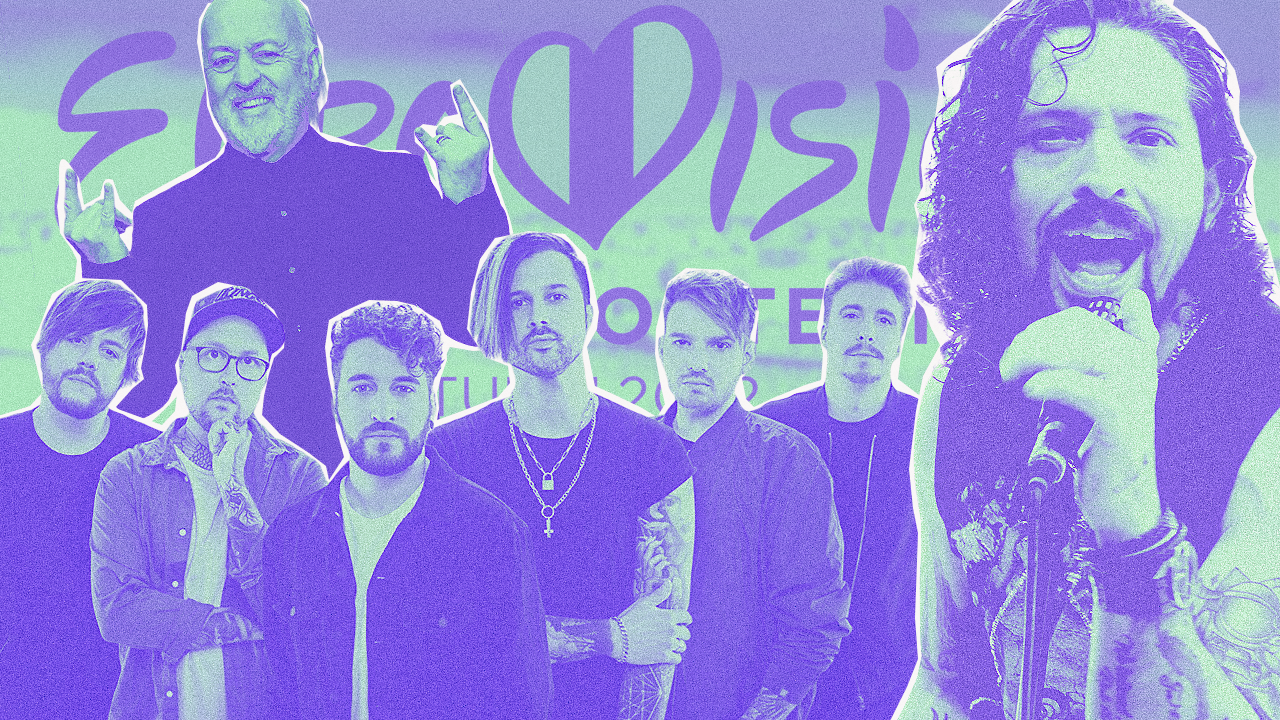In one of many surprises last year, the first place spot at the annual Eurovision Song Contest – a televised music competition known for championing camp, lavish pop music – was awarded to a band who played heavy music.
It's not the first time this has happened, of course. Back in 2006, prosthetic-clad Finnish heavy metallers Lordi took the crown with their gleeful, stomping Hard Rock Hallelujah performance. But their win was almost in spite of the music itself – audiences and judges were overjoyed by the gleaming novelty of it all, in a competition that historically embraces quirkiness and regional weirdness in all its various shades.
But the success of Italy’s Måneskin, Eurovision’s 2021 champions, has been... different. Since winning the competition, they've gone on to dominate the charts in multiple countries, collaborate with rock legend Iggy Pop, support The Rolling Stones, and at one point, even become the highest streamed artist on Spotify. It's not hyperbole to suggest they're the biggest rock band on the planet right now – their monthly listeners outstrip Metallica, Slipknot, U2, and even the Beatles.
It's wrong to pin all their success on their Eurovision win, of course – they were building a fanbase and scoring enviable chart positions around Europe before they won the competition – but it seems to have been the deciding factor in convincing a load of hard rock and metal bands that heading to Eurovision might be a viable career move, rather than an embarrassing footnote.
After all, it wasn't only Måneskin who repped heavy at last year's competition – nu-metal made an unexpected comeback via Finland’s Blind Channel, who came in at the sixth spot with their fist-pumping “violent pop” hit Dark Side, reminding us all of our love for Linkin Park and the soundtrack behind many nights in sticky, dimly-lit rock bars. Metal's place in Eurovision seems to have finally moved beyond the odd novelty and firmly into serious contender territory.
So, metal might be embracing Eurovision, but is Eurovision – which has typically been a place for cheesy, tongue-in-cheek pop or sickly, wind-machine-powered ballads – ready to embrace it back? Well, maybe. Although most countries haven't selected their official entries yet – they’ll need to battle it out against other artists from their countries for a chance to compete first – there has been an uptick in heavy bands throwing their hat in the ring. Here are some of our favourites.

Voyager
Australian prog metal wizards – and Prog Magazine favourites – Voyager have been shortlisted to compete in Australia Decides, the competition which will decide the country's entry for 2022's Eurovision. Formed in 1999, they’ve released seven albums across their career, and consist of vocalist/keyboardist Daniel Estrin, guitarists Simone Dow/Scott Kay, drummer Ashley Doodkorte and bassist/vocalist Alex Canion. Integrating new-romantic 80s vocals against intricate textures of flashy synth, technical Opeth-esque riffs and ambient soundscapes, Voyager are a genre-defying cosmic melting pot of prog metal, djent and power pop. It’s fair to say we’re brimming with excitement about this one. Fingers crossed they make it through the rounds.
Nanowar Of Steel
If you hadn’t already guessed it by their bizarre moniker – which is a pun formed from the combined names of metal bands Manowar and Rhapsody Of Fire – Nanowar Of Steel are pretty out there. Self-professed as a comedy band who take themselves very seriously, this Italian five piece will fit in comfortably among the gaggle of Eurovision kitsch. Whether they’ll manage to win the hearts of audiences across the globe with their OTT silliness and array of multi-coloured wigs is anyone’s guess, but they play some pretty heavy riffs, so it’s a thumbs up from us.
Eskimo Callboy
Eskimo Callboy – who will potentially need to rename for the competition – are one of Germany’s hopefuls. To give you an idea of where they're at, they call their unique blend of electronica, EDM, comedy rock, melodic hardcore and Lycra “porno metal”, for reasons we’re not entirely sure of. To imagine their sound, simply picture the hyperactive synth-soaked melodies of an arcade dance machine, coupled with some rather ferocious metalcore riffs. Feeling queasy? Us too. It's an acquired taste to say the least, but sometimes, that's just what Eurovision needs.
They’ve even put together a strange application video which you can watch below.
Intelligent Music Project
Bulgaria are one of the first countries to officially confirm their act, and they've decided on rock supergroup Intelligent Music Project – accompanied by Ronnie Romero of Ritchie Blackmore’s Rainbow – to represent them.
The assemble is made up of an ever-evolving line-up of all-star musicians, and is currently comprised of Bisser Ivanov, Slavin Slavchev (the winner of X-Factor Bulgaria), Ivo Stefanov, Dimiter Sirakov and drummer Stoyan Yankoulov, who has appeared on the contest previously before.
In the past, the IMP has welcomed the likes of Toto's Simon Phillips, Black Sabbath/Rainbow's Bobby Rondinelli Uriah Heap's John Lawton and many more. This sort of music is probably the kind that Gene Simmons claimed was dead, but wherever you stand on the matter, the Intelligent Music Project are intent on bringing good old fashioned rock'n'roll back to the masses with their huge anthem Intention. This one could be one to watch when the official competition kicks in.
Bill Bailey
To the dismay, but not complete surprise, of the UK public, 2021's Eurovision entry – the forgettable Embers, performed by loveable everyman James Newman – was a complete flop. Amassing a humiliating total of nil points, it probably didn't help that the song could've been snatched straight from an overtly cringe romance scene from the reality TV show Love Island.
Given the UK's heavy metal provenance, we're long overdue some metal magic repping our small, reviled island. Which seems to be exactly what Slayer-loving comedian Bill Bailey thought when he offered to throw his hat into the ring and write a song for the competition.
Hopefully said song will be just as fantastical as the oddball virtuoso comedian himself. Speaking to Good Morning Britain last year, he commented that the UK's entry “has to be a bit more drama, a bit more theatre. Because that’s what this show is about, Eurovision is a huge celebration. Some of it is totally bonkers".
In November, Bailey revealed that he had a slight change of plan with his idea for the show, and said that he believes the key to winning is now with a 'moody' entry in the minor key. In conversation with ITV's Lorraine, he said: "There's lots of things we have to address, the key for example. I'm a bit of a Eurovision nerd – we've been doing these upbeat things in the major key.
"The last 10 winners were all in the minor key. We've got to be moody – don't mention heart, don't mention walking." It's moody metal for us then please, Bill.
The Rasmus
The Rasmus, famously known for the early noughties goth anthem In The Shadows, fronted by the feather-haired Lauri Ylönen, have entered Finland’s annual Eurovision selection contest, UMK, Uuden Musiikin Kilpailu (The New Music Competition). Their entry song is set to be released on January 17, so there's not much to go off yet. But, if the track is as huge as their recently released singles Bones and Venomous Moon, they're certainly in for a good chance to at least make it all the way to the Eurovision final.
Trollfest
If it's trusty Eurovision tat we're all after, then Trollfest are Norway's best bet at getting Europe on their dancing feet. Their song Dance Like A Pink Flamingo is as gloriously silly as you'd expect, and their performance at their country's semi finals, which featured copious amounts of glitter, hot pink flamingo costumes and heavy AF riffs was a feast for the senses – even if it brought on a migraine headache or two.

